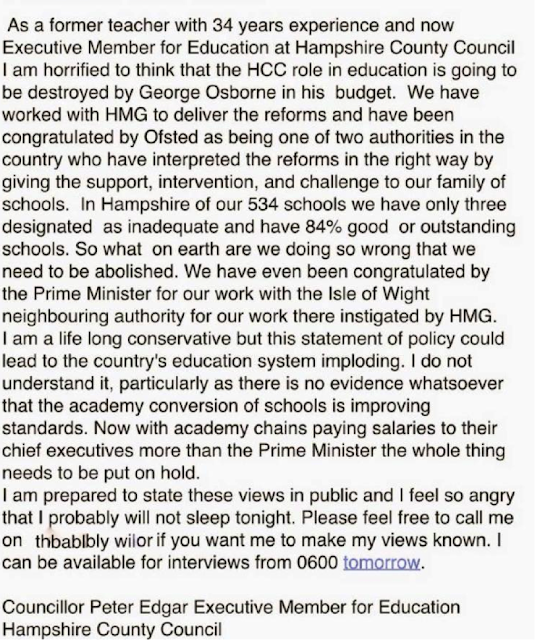From the Local Government Association
Responding
to the Chancellor’s Budget announced today, Lord Porter, Chairman of the Local
Government Association, in a key section of his statement said:
The LGA reiterates our opposition to forced academisation of schools. It’s vital
that we concentrate on the quality of education and a school’s ability to
deliver the best results for children, rather than on the legal status of a
school, to make sure that we’re providing the education and support needed in
each area.
Porter said:
It is
right that the Chancellor has recognised the funding pressures facing councils
and local services over the next few years and has not announced any more cuts
to local government.
Councils
now need a period of financial stability and consistency so they can plan for
the pressures facing local services which lie ahead over the next few years and
need to be protected from any more funding cuts during this Parliament. This,
alongside greater power to run local services, is essential.
Devolution
deals agreed today are good news for local communities and councils which have
worked hard to get them in place and rightly recognise the economic potential
of England’s county and rural areas. To build desperately-needed homes, create
jobs, provide the dignified care for our elderly and boost economic growth, all
councils need greater freedom from central government to take decisions over
vital services in their area. A total of 34 devolution proposals – from cities,
towns and counties - have been submitted across England. These new deals and
extensions to existing deals must signal a return to the early momentum in
which similar deals were announced last year. This will clearly require
different approaches for different areas, including how they are governed.
It is
disappointing that the Chancellor has not accepted calls by councils, the NHS,
care providers and the voluntary sector to bring forward the £700 million of
new money in the Better Care Fund by 2019/20 to this year. The failure to do so
means vulnerable members of the community still face an uncertain future where
the dignified care and support they deserve, such as help getting dressed, fed
or getting out and about, remains at risk. Vital social care services will also
increasingly be unable to help ease the growing pressure on the NHS and the
threat of a care home crisis will creep closer to becoming a reality.
Allowing
local government to keep 100 per cent of business rates is key and is something
the LGA has been campaigning to achieve for the last decade. While it
won’t in itself solve the long-term challenges facing councils and local
services, allowing local government to retain 100 per cent of its business
rates income is now vital. Pilots announced today are an important first step,
although it will be important to avoid a knock-on financial impact on other
councils, and local government will rightly need to play a lead role in making
sure any new national system works effectively and fairly.”






